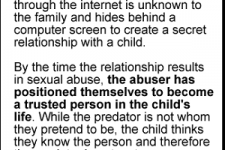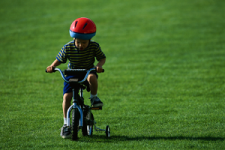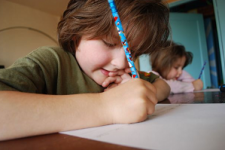Understanding and Developing an Authentic Assessment

March 12, 2012 by PLB · Leave a Comment
An authentic assessment has been defined by educationalist Grant Wiggins as “…engaging and worthy problems or questions of importance, in which students must use knowledge to fashion performances effectively and creatively. The tasks are either replicas of or analogous to the kinds of problems faced by adult citizens and consumers or professionals in […]
Preventing Child Abuse: Understanding Grooming

March 8, 2012 by PLB · Leave a Comment
Generally, abusers have a pre-existing relationship with their victims as well as access, authority and trust of both the parent and child. They may involve themselves in a family’s life and often do great things in the community. This is a trick. This is their game. This is their way of being open […]
Using Ebooks in Schools

March 8, 2012 by PLB · 3 Comments
Ebooks in schools are being increasingly effective as a tool that doesn’t just sit in the library but in part of the practical learning process in the classroom. But first let us define an ebook. Simply put, an ebook is a book that can be read digitally on a computer screen or on an […]
Using Technology for Teaching

The biggest benefit of using technology for teaching and learning is that digital media improves that which we are able to know and do. So, do we make up multiple presentations of the same content—using text for some, speech for others, and images for still others?
This just isn’t very feasible. Collecting and maintaining […]
Setting up a Classroom: Flexibility

March 1, 2012 by PLB · Leave a Comment
The learning environment plays a huge role in helping students grow and in cultivating their opinions and confronting them with concepts. It is therefore important that we take pay heed to the different elements involved in setting up a classroom.
In today’s world, a classroom that encourages hands-on experience is an obvious plus. The […]
Learning by Repetition: Does it Work?

February 28, 2012 by PLB · 2 Comments
One way of developing a skill is to make it a stored routine in the students’ system. To make this happen, the most important first step is to bring the skill to a conscious level where the student is deliberately thinking about the activity (not necessarily the skill).
In other words, the student knows […]
Using Mind Maps in Education

February 27, 2012 by PLB · 2 Comments
Wiki defines a mind map as “a diagram used to represent words, ideas, tasks, or other items linked to and arranged around a central keyword or idea.” The concept of a mind map is that the brain does not store information in the same way as most students write notes – line by […]
Assessment of Student Learning: Questioning and Discussion

February 23, 2012 by PLB · Leave a Comment
Using the technique of questioning and classroom discussions for an assessment of student learning provides the teacher with an opportunity to increase their students’ knowledge and improve understanding at the same time. Teachers, however, are cautioned that they should ask thoughtful, reflective questions rather than simple, factual ones and then give students adequate […]
Virtual Worlds in Education Versus its Dangers

February 21, 2012 by PLB · Leave a Comment
Virtual world websites are similar to gaming as users in both create an account and then use an avatar (picture or drawing) to represent them and move around. They differ from online gaming sites as the user isn’t there to play a game but to interact with the other users.
While virtual worlds have […]




